|
by Jim Paw-Paw Wilson Illustrated by Jock Dempsey and Walt Sherrill |
|
|
|---|
|
We are going to move back up to Constitution Island. I don't much like the idea of being close to that swamp on the east side, especially in the summer, but orders are orders. So we started packing up today, in order to leave tomorrow morning. This morning, I talked to Col. Callahan. I asked permission to change the order of march that we use in the Artificer company. Up until now, I have had the men who could not ride in the wagons march as a formation in front of the wagon train. First Sgt. Baker could ride in a wagon, but I asked him to lead the marching unit, and he has done so. That has left me free to ride back and forth along side of my company to keep track of everything. I'm going to have the 27 men who normally march in the lead platoon divide into three groups. Eight men will march on each side of the wagon train, leaving 10 men and First Sgt. Baker to march at the rear of the formation as a rear guard. I will ride at the front of the wagon train, except when I need to move around. The two platoon sergeants will each lead one of the files that march beside the wagons. That way, we have protection all the way around the wagons. Col. Callahan agreed that that would be a better way to move, so I've explained it to all of the NCO's. With First Sgt. Baker leading the rear guard we should be able to maintain good control over almost any situation that develops. It may be a bit awkward at first, but I'm sure the men will get used to it. They all learn quickly. I don't think I have a stupid man in the company. There are a couple that don't like to work very much, but their platoon sergeants and the First Sgt. take care of that. One thing that I emphasized to the NCO's is that I don't expect the men on the flanks to be able to maintain proper intervals, or stay in step. They will not march in "formation", but will stay as close to being in line as possible. I want them to maintain proper decorum, but I don't expect perfection. The roads are usually rutted and difficult to walk on when you are in the middle. Moving along the sides as the flankers will be doing is even more difficult, due to the un-evenness of the shoulders. As long as they step along the route and keep up, everything should be fine. In addition, I'm training them that if trouble should break out on one side of the wagon train the troops on the other side stay where they are unless I tell them differently. I don't want all the troops to run to the "trouble" side and leave the "quiet" side un-guarded. Tom and Rob and the men really surprised me this morning. I was just starting to wake up, when a bunch of them sneaked up to the wagon and started singing a birthday song to me. I've had to listen to "Happy Birthday, Captain Dunagen!" all day long. The bad part is that I don't know when their birthdays are, so I can't get even! I am 21 years old today. I wish I was home with Dee. Next time I write, I'll ask her to find out when Tom and Rob's birthdays are. We've been here on Constitution Island for a little over a week. We have done very little beyond working on the so-called "curtain wall" that faces down river. It's all stone work, so all Tom and I have had to do is sharpen tools for the stone mason. The troops built a split rail corral for the horses, so we parked our wagons along the north side in the same formation that we normally do. It's been pretty hot, with a couple of days of rain. I've been sleeping in the blacksmith wagon again, that's easier than setting up a tent. This is a boring place to be. The mosquitos get pretty bad, especially in the evening and at night. The only good thing about being this close to the swamp is that the men have caught several turtles, so Cookie has made turtle stew several times. I like the flavor of it, although the meat is a bit tough. But it makes a nice change from the beef. I wish the colony could send us some pork. A lot of the beef is tough and stringy, like the cattle are not getting very good forage. Well, it seems we are going to be moving again. I suppose it is normal, the army seems to do as much marching, if not more, than fighting. And we seem to get shifted from construction project to construction project. Col. Callahan says that's the fault of the Artificer's company. We've apparently developed a reputation for getting things done quickly and efficiently. It almost makes me want to tell the men to slow down, but I just can't do that. Master John taught me from the very beginning to work as fast as I could without sacrificing quality. And I must have given that attitude to the men without really intending do, because they all work that way. Except for a couple, but First Sgt. Baker doesn't have to say anything to them anymore, he just looks at them. It's funny, he tips his head down and raises his eyebrows when he looks at them and they immediately start to work harder. I'm not sure I want to know how he managed to train them that way, I suspect it had something to do with personal counseling out behind the corral a couple of times. I've heard a few groans the morning after some of those session, and First Sgt. Baker's knuckles seem to be skinned pretty regularly. We're on the road again. Somebody should write a song about that. We are on the way to a Fort Schuyler, in western New York. It's close to Lake Oneida, I think. I say we're on the road, but it's not much of a road. The company commanders have all chosen ten men to serve as "pioneers" They go ahead of the regiment with axes and saws, widening the road. That has slowed us down quite a bit. We thought we would get to Ft. Schuyler by about the fifth of August, but it's going to take longer than that. Every night, we set up the forge, so Tom and I can spend several hours sharpening axes and saws. When Cookie tells us that supper is ready, we take turns going to eat. I usually manage to be busy with an axe and send Tom first. When he gets back, I go eat. A couple of times, we've had to set up candle lanterns on the tailgate of the wagon to be able to work after dark. When we have to work that late, Rob always drives the next day and Tom catches a few winks of sleep in the wagon. Baron is a nice steady horse, so I usually manage to nap a bit in the saddle. My mind is in a turmoil. I've felt sick to my stomach most of the afternoon. I killed a man shortly after we ate the noon meal. We had only been back on the road for an hour or so when we were attacked by a party of Indians. There were only a few of them, apparently they thought they could attack the wagon train, take a few scalps, steal some goods, and get away before the regiment could rally. 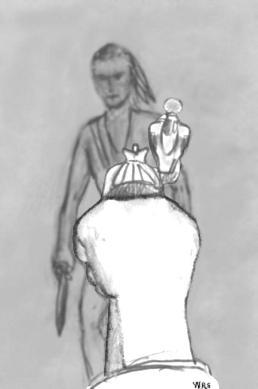
When they first fired, three of the men on the off side of the wagon train went down. The rest of the men on that side immediately returned the fire. When I saw that all of the firing was on that side of the train, I sent half the men from the near side over to reinforce them. As I was riding between two of the wagons, I saw one of the attackers bending over one of the downed teamsters with a scalping knife in his hand. I had already drawn one of my pistols from it's holster and cocked it. I took a quick sight and fired, almost without looking. The ball hit him in the forehead. After the fight was over, seeing the dead man and knowing that it was my shot that had killed him made me sick to my stomach. None of my men were killed. By the grace of God, they were only wounded, and not seriously at that. The man who was almost scalped looked like he was dead, though. A ball had grazed his head and knocked him unconscious. I thought I would be able to do what I had to do, but I didn't know that killing someone would affect me the way this has. Actually I guess I was able to do what I had to do, but I hope I don't ever have to do it again. Colonel Callahan and a squad of troopers came rushing back to the train to help, but when the Indians heard them coming, they immediately ran. I grabbed my second pistol and took a quick shot at one of the Indians as they were running away. I think I nicked him, he stumbled, but then recovered and got away. Four of the attackers were left behind, all dead. Colonel Callahan said that the thing that kept the attack from being much worse than it was is the way the men reacted when the attack started. This was the first time most of the teamsters, including myself, had been under fire, but he said we reacted like seasoned troops. I was hoping that no one had seen me kill my victim, but someone did. Whoever saw it told the man who was wounded what had happened and he came to thank me shortly after the fight. Other teamsters heard him and now they are calling me a hero. I don't feel like a hero. I feel like a murderer. I know I did what I had to do, and I'm glad I was able to save my man. But I feel bad anyway. I wish we had a priest for me to talk to. My hands were shaking so hard after the fight that I had a hard time re-loading my pistols. The strange thing is, I don't remember them shaking at all during the fight. My mind seemed to be very clear, and it was almost like time stood still. I could see exactly what was happening, and knew exactly what to do. My hands are still shaking but not as much. But I'm glad I listened when Master John talked about marching with General Washington. One of his stories was about having flankers out to protect the sides of the column. I remembered that story and that's why I changed our marching formation. We are at Fort Schuyler. We got here about noon. The troops that are here are somewhat in a state of shock. But they are jubilant as well. It seems that British General "Gentleman Johnny Burgoyne" was marching for Fort Until now, I've been letting Will tell his own story. I've changed some of the terms to modern terms to make them more understandable, and I've corrected some spelling (Will was, to say the least, a rather creative speller!) However, in general, this is Will's story, told his way. But at this point, some explanation is needed. All of Will's journal books are hand bound. They have 250 pages, plus or minus a few. This book has one outstanding characteristic. As you can see, the entry for August 7, 1777 ends right in the middle of a sentence. Then there are a number of pages that have been cut out, presumably with a sharp knife. About a 100 pages just aren't there. We'll never really know why, but I have a private theory. I think that as the war heated up, Will continued writing about his combat experiences. Then at some later time, he decided that he just didn't want anyone else to know what was on those pages. Perhaps the experiences were too painful for HIM to read any more. War is like that, sometimes. Will's entry for August 5, 1777 reveals that he was a somewhat sensitive person, and that combat was traumatic for him. Later, in some of the other books, there are occasional references to events during that time, but they are never very detailed. Tom and Rob occasionally tell a few things that happened, but Will rarely says anything about what they say. I think he just wanted to forget about it. Out of all the possible reasons, I'd rather like to think that was his reason. At any rate, the story on the remaining pages of this book begins again on October 20, 1781. That was an important date, because that's the day that.... Well, I'll let Will tell you. 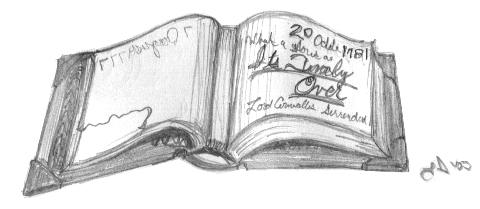 What a Glorious day this has been! Lord Cornwallis surrendered today! No treaty has been signed with England yet, but the surrender of Lord Cornwallis's forces
means that England no longer has an effective fighting force here in And that in turns means that we are going home! The Continental troops will need to stay for a while yet, to handle the English prisoners, collect their last pay (hopefully!), and other administrative details, but since we are a Colonial regiment, we are free to go. Colonel Callahan received a written order from General Washington this morning, releasing us from duty, and acknowledging the bounty that was given to every man in the regiment a year ago, when we agreed to stay with him for the duration of the war. The bounty is for 200 acres of land of our choosing, as long as it is land that has not yet been settled. I will think about that later, for now I just want to go home to Dee and the children. We are going to stay for two more days, to clean up and clean our equipment before we start the long march home. It has been so long, almost two years now. I'm afraid that Willie and Dee Dee will not recognize me. The men have decided to go home as a unit. I rather expected that they would. The pain and hardship and losses of war have bound those of us who are left into a family that I think is closer than brothers. Sadly, there are not as many of us as there were when we left our homes so long ago. I am much more fortunate than the other company commanders, for many of them have lost over half of their companies. I have only lost 14 of my men, but I want to record their names for all time. From the first squad of the First Platoon, Kelly, O'Brien and O'Neill are gone. From the second squad of the First Platoon, Burke, Daly, Kennedy, and Murray rest beneath the sod. From the second platoon, Sgt. Patrick McCadain is not here, he was sent home after he lost his foot at the Battle of Cowpens. Sgt Brown is now the platoon sergeant. From the First squad of the Second Platoon, Casey, Hughes, Martin, and Nolan are with their Maker. And from the second squad of the Second Platoon, Brady, Healy, and O'Shea have gone to their reward. I will regret their loss for the rest of my life. I often wonder if I could have trained them better, cared for them better or done anything at all to keep them alive. I can only pray for the repose of their souls and hope that I will see them again someday. They died in different places, at different times, and they rest where they fell. I miss them. I wrote to each of their families as they fell, as was my duty. Now I must go and face their questions, spoken and un-spoken. I have resolved to visit their families to tell them personally what hero's their sons, brothers, and lovers were. That will be hard for me to do, but in all honor it is something that I must do. Many of the other men have been wounded at various times. A couple still limp from their wounds. But they have refused to go home, even though offered the opportunity. Every one of them is a hero to me. Once more, we are on the road. But there is a big difference this time, for we are on our way home. It's almost 600 miles, so it will be nearly three weeks before we arrive. 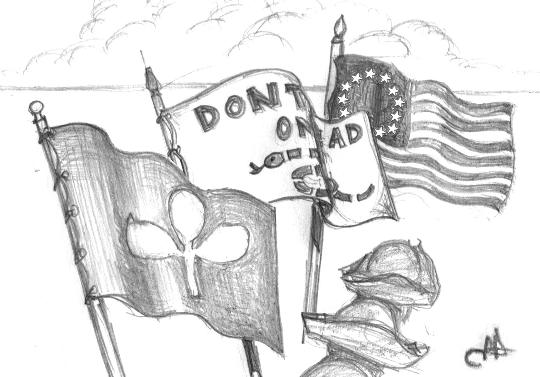
This morning, we started out with our flags flying, and the fife and drum corp playing Yankee Doodle. Strangely enough, there was a British officer, a Captain, waving good bye to us. I haven't written about that yet. 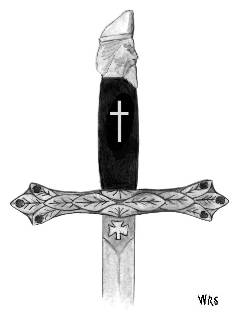
On the 20th of this month, after the surrender, some of the British Officers were visiting our camp. One of them had stopped to talk to me, when he noticed my sword. He asked if he might see it. I showed him the hilt, and drew sword enough for him to see the gold cross set into the hilt. Then he showed me his sword, and asked where I had gotten mine. For you see, his sword was almost exactly like mine, with one difference. His sword had rubies where mine had sapphires, and sapphires where mine has rubies. When I told him where I got my sword, he got tears in his eyes. He is Mistress Prudence's brother, and Dee's uncle. He is going to sell his commission and come to see us. His parents have passed away, somehow they had lost track of Mistress Prudence and he did not even know if she was alive. Quite an emotional moment for both of us. I can't wait to tell Mistress. And I can't wait to get home, but the troops are not marching as hard as they can. In a way, it's almost as if we are reluctant to get home, for then we will no longer be together. These men are the brothers I never had. But I can't wait to hold Dee in my arms once more! Continued in chapter 4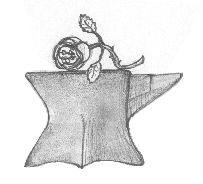 |